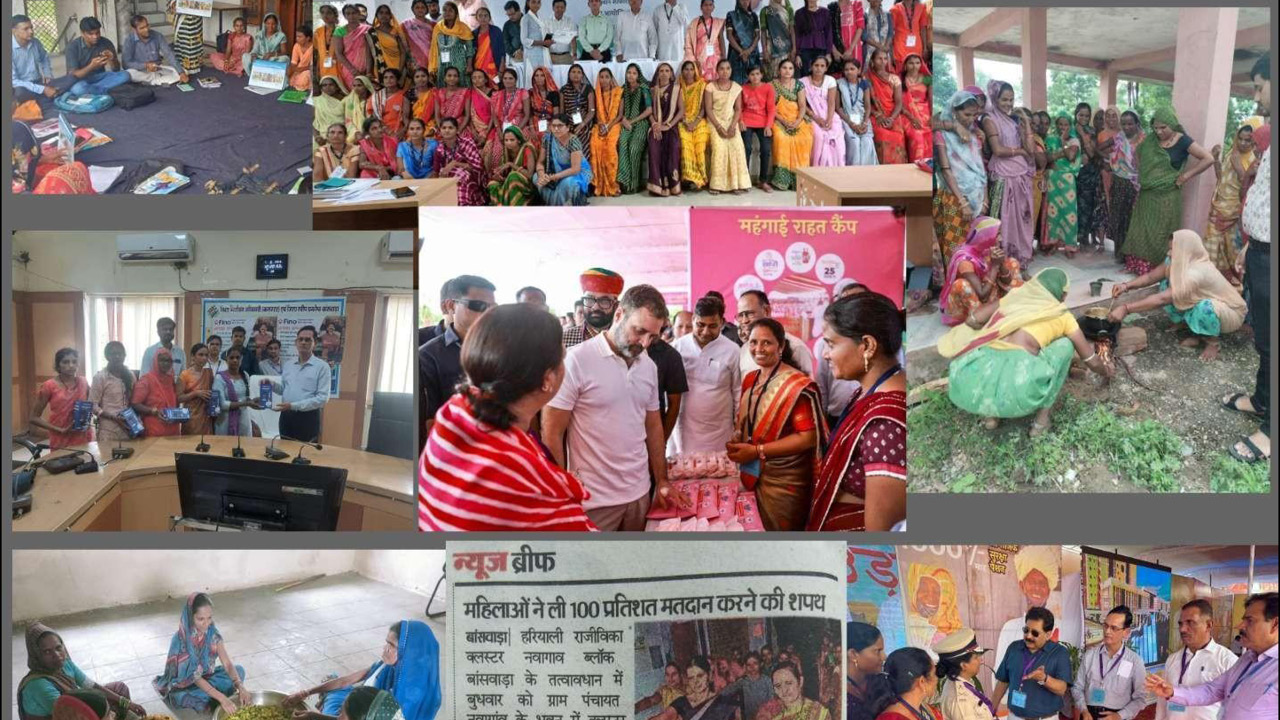Women Empowerment through Ajeevika – Rajasthan Grameen Aajeevika Vikas Parishad (RGAVP), Government of Rajasthan

Women Empowerment and Livelihood Linkages in Rajasthan
Problem
- Absence of women entrepreneurs due to lack of confidence in tribal areas
- Ideas present, but a lack of skills and support prevent them from taking form
- No platforms to display talent, and inability to afford marketing and branding
- Difficulty in accessing financial support from institutions
- Familial skepticism towards women venturing outside for work
- Women’s own lack of confidence stemming from limited education
- Societal disapproval of women partaking in new, divergent activities
Solution
- Registering women in SHGs through the CRP team for consistent savings
- Availing hand-holding support via RGAVP and the district livelihoods plan under NRETP
- Facilitating participation in SARAS melas and exhibitions across various cities
- Assisting in securing loans via the DAY-NRLM scheme and other credit linkage programs
- Transformation of traditional tribal hunting tools into professional archery sets for sale
- Aim to promote tribal culture and uplift archery as an esteemed sport on global platforms
Outcomes
- Enhanced confidence and economic fortification of women through SHGs
- Success stories like Payal Teergar, who initiated a bamboo handicrafts business with RGAVP’s assistance
- Exposure and lucrative deals via SARAS Melas and exhibitions across states
- Access to low-interest loans from SHG, CLF, and special PMFME loans
Project Details
Category: Women Empowerment and Livelihood Development
Project: Women Empowerment through Aajeevika
Organisation: Rajasthan Grameen Aajeevika Vikas Parishad (RGAVP), Government of Rajasthan
Start Date: 02-Oct-2016
Problem
In the tribal areas of Banswara, women faced daunting challenges that curtailed their entrepreneurial aspirations. Their lack of confidence prevented them from establishing businesses, even though they harboured innovative ideas. Even if they mustered the courage, there was an evident absence of platforms to showcase their talent. Additionally, being new to the entrepreneurial scene, they couldn’t afford the requisite marketing and branding. Further complicating matters was the inaccessibility of monetary support from financial institutions, making it challenging to get their ventures off the ground.
Familial reservations meant many were hesitant about allowing their women to work outside. In many instances, the women themselves lacked confidence, often a result of limited education. The broader societal framework wasn’t always supportive either, with many criticizing women for adopting roles and responsibilities perceived as unconventional.
Solution
In the midst of these challenges, innovation thrived. Tribal traditions, such as using bows and arrows for hunting, were revamped into professional archery sets. These sets catered not just to traditional uses but were also marketed to professional training institutions. The primary goal was two-fold: to champion and represent tribal culture and to elevate archery’s stature, positioning it as an award-winning sport at national and international levels.
To counter these challenges, RGAVP devised multi-pronged solutions. Women were registered in Self Help Groups (SHGs) with the assistance of the CRP team, ensuring a structured savings approach. Leveraging the RGAVP platform and support from the district livelihoods plan under NRETP, these women were granted the mentorship and guidance they required. To give their talents and products the visibility they deserved, they were introduced to SARAS melas and exhibitions in prominent cities like Jaipur and Delhi. Moreover, efforts were amplified to help them access financial backing through the DAY-NRLM scheme and various credit linkage programs.
Outcomes
The solutions bore substantial outcomes. By integrating women into SHGs, they found the confidence and support to fortify their economic position. Stories like Payal Teergar’s emerged, who, with RGAVP’s support, embarked on a bamboo handicrafts venture. The intervention helped her realise her dream of transitioning from a poor tribeswoman to a successful entrepreneur in ‘Chandu Ji Ka Gada’ village. She joined a SHG under RGAVP and through their support and exposure through various schemes, she started her business. Today she is exporting bamboo made bows and arrows to Maharashtra, Gujarat and Uttar Pradesh. She sells several other bamboo made items such as trays, cups, pen stands and catapults which enabled her to achieve Rs. 10 lakh+ in transactions every year.
The outreach and exposure provided through SARAS Melas led to greater visibility and fruitful business engagements with buyers from different states. Furthermore, they could secure loans at nominal interest rates through SHGs, CLF, and special PMFME loans, streamlining their economic activities.
The journey of women like Payal Teergar exemplifies the transformative potential of initiatives like RGAVP. By fostering a climate of empowerment, innovation, and economic growth, RGAVP has not only elevated individual lives but has also significantly impacted communities. With over 2.83 lakh SHGs in 352 blocks across Rajasthan, the impact is undeniable. Efforts like these, inspired by visionaries like Mohammad Younus, are paving the way for a more equitable and prosperous future.

